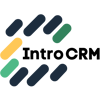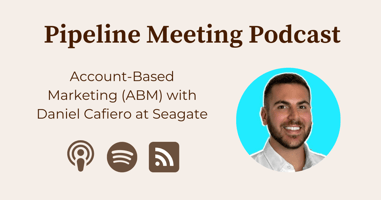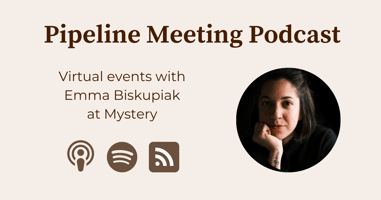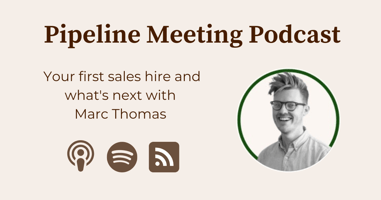Account-Based Marketing (ABM) is an emerging go to market tactic used in enterprise sales. Dan...
How personality can drive sales with Brandon Kim at Crystal
Brandon Kim is the VP of Marketing at Crystal, a powerful personality data platform that sales and marketing teams are using to increase sales.
Show Description
A marketing podcast about sales. Hear short interviews published every week.
Subscribe to follow the latest trends in revops, demand gen, lead gen, sales enablement, and B2B marketing.
Subscribe
Popular Platforms
Apple Podcasts
Spotify
RSS Feed
Also available:
Amazon • Anghami • Castbox • Castro • Deezer • GoodPods • Google Podcasts • iHeart Radio • Overcast • Pandora • PlayerFM • Pocket Casts • Podcast Index • Podchaser • Stitcher • TuneIn
Show Notes
Brandon Kim is the VP of Marketing at Crystal, a powerful personality data platform that sales and marketing teams are using to increase sales. It works by understanding your prospects better, primarily with the DISC assessment.
Brandon shares how they believe more personalized communication is the future. Whether that's one-to-one conversations, multi-stakeholder B2B deals, or any number of other use cases for the product.
Noteworthy topics include Myers-Briggs, DISC, Enneagram, adaptive selling, and how the Crystal LinkedIn extension and free assessment tools can help people get a sense of how the product works.
Find Brandon on LinkedIn: https://www.linkedin.com/in/brandon-kim-39aaa529/
Find Crystal online: https://www.crystalknows.com/
Transcript
[00:00:00] Intro
[00:00:00] Harris Kenny: Welcome to Pipeline Meeting where marketers come to talk about sales. I'm your host Harris, Kenny, and I'll be joined by guest every Monday and Wednesday for brief 15 minute interviews where we'll share tips that you can apply to support your sales team and help them close more deals.
[00:00:15] Harris Kenny: You don't have time to listen to this whole episode, you can skip ahead in the show notes in your podcast player, or find the transcript at introcrm.com/podcast. All the episodes are published there.
[00:00:28] What is adaptive selling?
[00:00:28] Harris Kenny: can you tell me about what adaptive selling is and it's different than how people normally sell?
[00:00:34] Brandon Kim: Adaptive selling is something that's been around for I'd say a few decades now. There's actually a lot of research from the American Marketing Association, the Journal of Business Research, that's probably dating back to around the early two thousands, to the mid two thousands.
[00:00:48] Brandon Kim: all that it is, is saying that whenever you have a member of the sales team, how they communicate with their prospects is vitally important into eventually completing a sale.
[00:01:01] Brandon Kim: And so the concept of adaptive selling is that you shouldn't take a cookie cutter air approach whenever you're approaching someone. Really try and empathize and understand the personality, be behind the buyer that you're looking to sell to.
[00:01:14] Brandon Kim: There is actually statistical evidence that if a salesperson adapts to the personality style of their buyer, they are more likely to increase the outcome of a purchase.
[00:01:25] Brandon Kim: Especially in a time today where really sales professionals are and sales outreach is automated. It's more of a volume process as opposed to kind of a quality process.
[00:01:35] Brandon Kim: And we actually think that pendulum is going to shift back in order for brands and companies to make a difference to their buyers is they're gonna have to go back and instead of doing the automation and the quantity game, they're gonna have to focus on the quality of their sales conversations moving.
[00:01:51] Personality assessments
[00:01:51] Harris Kenny: Can you just give me a 101 on different types of assessments, the types of tools that you tend to use. I know there's material on your site, on the crystal site about DISC and enneagram and different types of personality assessments and just overview of that field and maybe which ones you find more interesting or more relevant to your work.
[00:02:10] Brandon Kim: The history of Crystal has been, uh, we've provided free personality assessments to our users. Whether that's, big Five, Myers Briggs, which are popular, Enneagram has also been popular. And DISC is another proven frame personality framework to really categorize how you fit in and how you identify yourself.
[00:02:30] Brandon Kim: How I see it is that Myers Briggs and other personality tests really give you a self-reflection of who you are as a person, however, DISC relates that into how someone else's personality is and how do you best and effectively communicate with them.
[00:02:45] Brandon Kim: We actually tested multiple personality frameworks, and landed on DISC as the framework that is the most relevant for the particular use case that we're looking to tackle, which is to improve communication.
[00:02:58] Brandon Kim: There are vastly different personalities and they like to be pitched to in a different fashion.
[00:03:03] Brandon Kim: Using the disk framework. There's what we call a dominant type of personality that really likes to, keep things short, brief, concise, and get straight to the point.
[00:03:14] Brandon Kim: So when you're pitching to them, it's adding the fluff, building that camaraderie and relationship is not really interesting to them as their natural personality tends to be, uh, against that.
[00:03:24] Brandon Kim: On the flip side of that, we have s types, which are more kind of steady personality types.
[00:03:30] Brandon Kim: These are personality types that like to build a relationship with the seller that they're working with, and they like to exchange pleasantries and really understand the person that they're looking to buy from.
[00:03:39] Brandon Kim: Just taking a single person, uh, depending on if they're a dominant type of personality or a steady type of personality, how I approach them in a sales capacity would be vastly different.
[00:03:49] Brandon Kim: And how I communicate them would be vastly different as well.
[00:03:52] Brandon Kim: Even it's the same exact product. I may go straight towards the sales pitch for that dominant type of personality. While for the steady type of personality, I may use the first five or 10 minutes to really connect with that person to understand that person, um as a human.
[00:04:07] Harris Kenny: I gotta sidetrack you really quick, given that you have background in sales and now that you're in marketing. And then I wanna jump into what this looks like in practice with the product. Cuz I'm really, really curious how you actually do this.
[00:04:18] Harris Kenny: But what is one thing that you think having been in sales and now being in marketing, what's one thing or a couple things that you think marketers don't understand about salespeople, about the job of a salesperson?
[00:04:31] Value for sales
[00:04:31] Brandon Kim: As a marketer, a salesperson's job is really an art and it's really to connect with people. It's to be included in as many conversations as possible. And for a lot of the times for a salesperson, it's knowing what not to say rather than knowing what to say during a sale.
[00:04:46] Harris Kenny: Helping 'em see, avoid wrong things to say, wrong ways to communicate. Helping them cover, helping them, uh, discover blind spots maybe that they don't know going into the calls sounds like you're saying.
[00:04:55] Brandon Kim: Exactly, and this is more than just data enrichment for, let's say if you're looking to target a person, like what is their geographic location? What is their title? What is their typical kind of firmographic information? It goes beyond that to actually go into the actual person behind who they're speaking to.
[00:05:12] Brandon Kim: That's where we think personality data is going to really come into play with the sales team, and how marketing teams can arm the sales team with that data and insights. We see that being extremely important. Especially in the world of robot calling and, and, and canned email templates.
[00:05:28] How Crystal works
[00:05:28] Harris Kenny: Let's jump into how Crystal specifically enables this, because I'll just say like outta the gate, my first question is obviously, or presumably, I'm not sending DISC assessments to every single one of my prospects , because that would put some friction maybe sometimes, maybe in some scenarios, but I'm guessing that's not how it works by default.
[00:05:47] Harris Kenny: So how, how does it work by default that you know about the personality of the person that you're working with, if you're not asking them to do these assessments?
[00:05:54] Brandon Kim: Yeah, I would guess that if you ask your prospects to take a 10 minute assessment, you'd probably get a pretty low conversion rate. And they'll probably never respond back to your calls, but, Without going and revealing too much of our secret sauce, the way that our product works is that, we have a Chrome extension, a free chrome extension that you can download and that Chrome extension works with LinkedIn.
[00:06:14] Brandon Kim: As you navigate to different, prospect profiles, we analyze all of the information and content that's within that particular profile. So we look. Job experiences, skills, the way they write posts. All of this information, we analyze to then predict a DISC personality type for the profile that you're researching, and then based on that personality profile, we there then share insights on how to best communicate with them all across
[00:06:43] Brandon Kim: the sales cycle. So whether you are a stranger, reaching out to the prospective buyer for the first time, and you're prospecting. or whether you've had subsequent conversations and you're negotiating pricing, for example.
[00:06:54] Brandon Kim: We give tips for how to communicate during the different stages of that sales process based on the personality that we've predict.
[00:07:02] Harris Kenny: Interesting. And you're doing assessments as well, so you've got first party data that you are collecting. I'm assuming that when someone takes one of your assessments, you also get a chance to cross reference, right? And build your own understanding. You're not just guessing from what's on LinkedIn profile.
[00:07:16] Harris Kenny: You also have your own research that you've been doing on this stuff.
[00:07:19] Brandon Kim: That's correct. Yeah. So we've built a personality assessment, and that's actually to help out with more leaders, and managers that are really looking to onboard a large sales team and really understanding how to best coach and activate them.
[00:07:32] Brandon Kim: While we do have our own first party data in terms of getting those personality assessments, what I will say is that our predictions pretty accurate.
[00:07:39] Brandon Kim: We actually ran a study on how accurate our predictions are and across a survey of 200 respondents, we gotten the metric of, of approximately 85% of the time, our predictions are accurate.
[00:07:52] Harris Kenny: Wow, that's higher than I would've guessed.
[00:07:55] Brandon Kim: Yeah. Yeah. And
[00:07:56] Harris Kenny: No, I mean, no offense, I'm not knowing anything about it, but just that seems really high to me.
[00:08:00] Brandon Kim: Yeah, we, we take a lot of inputs. We analyze a lot of content, in LinkedIn and, uh, other publicly available online data platforms. So we mix those two together to come up with that.
[00:08:11] Brandon Kim: What I will say is that, Personality assessments, there's really no way to get a hundred percent.
[00:08:16] Brandon Kim: Even if I do take a 10 minute assessment there's still that delta where it could be a little bit off. We've seen that number to be around 95% when they actually sit down and take a personality assessment. So we're always working on our algorithm to, to increase the accuracy of it to get that higher rate.
[00:08:31] Brandon Kim: But right now, um, it's at that 85%, which we think it's pretty good.
[00:08:35] Brandon Kim: And for the marketing lens, I think our product is really taking personalization to the next level. And that's kind of how I think of it.
[00:08:42] Brandon Kim: Personalization and marketing is going to advance from High input variable first name. This is your job title. This is the company that you are a part of.
[00:08:51] Brandon Kim: We think it's gonna go a layer deeper into kind of contextual elements of how you actually word and phrase things. For a marketing perspective, if personalization is something that you pride in your company, our tool is going to really advance you into that so that you can kind of speak to different personalities that anyone can take.
[00:09:10] Uses outside of sales
[00:09:10] Harris Kenny: That makes a lot of sense to me. So adaptive selling, but really adaptive communicating. I mean, I could imagine you connect this with some internal email newsletter tool and you have a few different versions of a product announcement, an internal product announcement based on the way that different type of people prefer to get the information.
[00:09:29] Brandon Kim: Exactly. Yeah. And this is not just a peer-to-peer conversation as well, but we provide insights for a manager to team member conversation as well. So whenever you need to have a conversation around a one-on-one or deliver feedback or reject an idea, like we give different ways that you can have those conversations based on the on, on the different personalities and how to optimize that.
[00:09:51] Harris Kenny: I feel like we've covered so many different things that are making me think. Is there anything that we haven't talked about that you think is exciting right now, or something that's coming up or something that you feel like people miss when they first start thinking about this?
[00:10:04] Applying to ABM
[00:10:04] Brandon Kim: Yeah. So the other use case that I neglected to bring up was when there's a project or a sales opportunity where there are multiple stakeholders or a bank. And typically we see this in B2B sales predominantly. The concept of account-based marketing or account-based selling has gotten a lot of popularity.
[00:10:21] Brandon Kim: And it makes sense to do so cuz you're really targeting kind of the high value accounts that you want to target. But a lot of these times, whenever you're involved in a deal like that, there are again, multiple stakeholders that you need to communicate with.
[00:10:33] Brandon Kim: And so one of the, the capabilities that our clients really love is to be able to create different personality playbooks for the multiple stakeholders that are in a buying committee.
[00:10:45] Brandon Kim: If you are moving in towards a account-based marketing or an account-based selling motion, adding in a layer of personality data towards the different members of the buying committee really helps you communicate more effectively across different buyers.
[00:11:01] Brandon Kim: And again, taking the same example that I gave before, you may have someone in the buying committee that's really dominant, that's really short. And wants to get to the meat of the conversation quickly.
[00:11:11] Brandon Kim: And you might also have someone that wants a little bit more data and wants a little bit more, time to make their decision and form their thoughts.
[00:11:19] Brandon Kim: Understanding that going into that meeting is going to be really important because that's how you should communicate with them to align with their natural personality.
[00:11:27] Harris Kenny: I think even just thinking about this at all, even if someone's limited in how they adopt a tool like this, just thinking and remembering that different people communicate in different ways, have different backgrounds, have different perspectives. It's just fundamentally the job of sales and marketing as well, right?
[00:11:43] Harris Kenny: Of having that empathy for where is someone coming from down to the personal level of how they tick and how they communicate, and how they wanna be communicated with.
[00:11:50] Brandon Kim: Exactly. I think no one wants to feel like a robot is serving them or they're just one ticket, uh, among many. Especially when the price tag for purchasing something is at a high amount.
[00:11:59] Harris Kenny: If someone's leaning in, they wanna know more. Where can they learn about Crystal? Where can they follow you? And hear your 2 cents on this.
[00:12:08] Follow Brandon Kim
[00:12:08] Brandon Kim: The best way to learn about Crystal is by going to our website at crystalknows.com. That's www.crystalknows.com. For those that have more pointed questions, you can definitely reach out to me personally. My email address is bkim@crystalknows.com. Happy to answer any questions.
[00:12:29] Brandon Kim: The call to action that I leave behind is we have a free product that people can try out. The best way to test out and see if this will be valuable to you is actually download our free Chrome extension and to give it a shot. And for those that are interested in kind of a more in-depth product demo, we'd be happy to facilitate that as well.
[00:12:45] Outro
[00:12:45] Harris Kenny: That's all for now. You can find show notes at intro crm.com/podcast. The theme music for Pipeline Meeting is by Neighbourhood Vandal. If you learned something, consider sharing this show with a friend. Thanks for listening.



